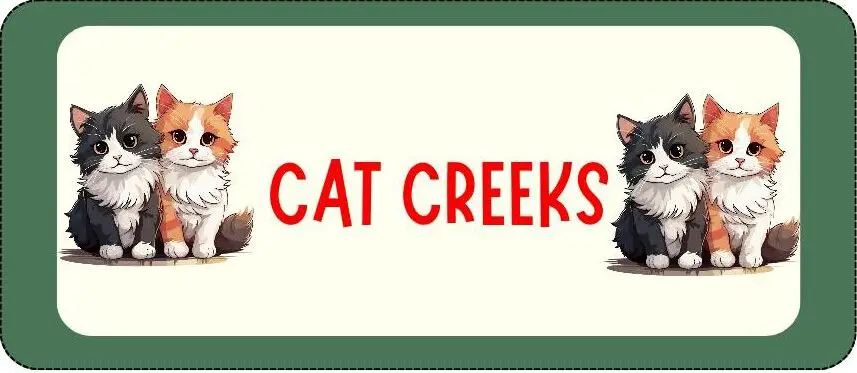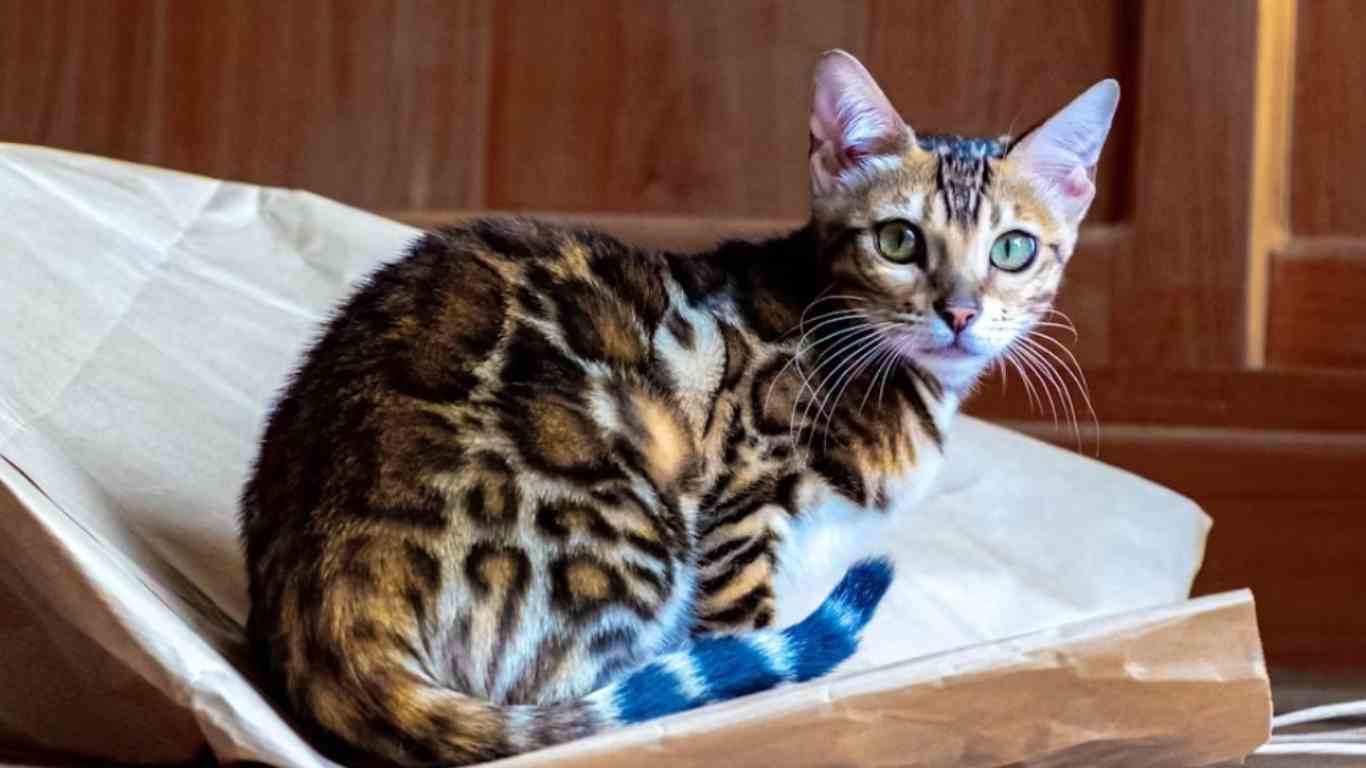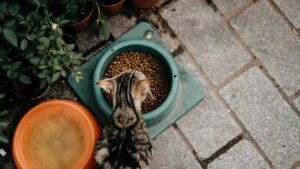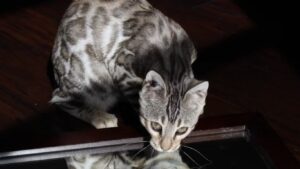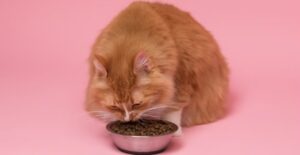If you’re worried about your Bengal cat’s sudden loss of appetite, you’re not alone, am here to help you understand better!
In this article, I’ll explore the top reasons why your Bengal cat might be refusing their meals and provide some helpful tips to get their appetite back on track.
So, let’s jump right in and get your Bengal purring with delight again!
Reasons Your Bengal Cat Is Not Eating
When your Bengal cat stops eating there could be many reasons to be considered such as a dental problem, underlying illness, sudden change in their diet, significant changes in their environment, gastrointestinal problems, and hairball issues.
For a better understanding of these reasons let’s break it down…
Here are some of the most common reasons your Bengal cat is not eating:
Dental Problems
When a Bengal cat experiences dental problems, such as tooth decay, gum disease, or oral pain, they may refuse to eat.
To identify this issue, observe if your cat shows signs of discomfort while eating, such as chewing on one side of their mouth, drooling excessively, or pawing at their mouth.
Bad breath and swollen gums might also indicate dental problems.
If you suspect dental issues, it’s crucial to take your Bengal cat to a veterinarian for a thorough examination.
The vet will assess the cat’s oral health and recommend appropriate treatment, which may involve dental cleaning, tooth extraction, or other interventions.
Pain medication or a change in diet may also be prescribed to make eating more comfortable for your cat.
Changes in Diet
A sudden change in diet can disrupt a Bengal cat’s eating routine and lead to a loss of appetite.
If you recently switched their food brand or introduced a new type of food, it’s possible that they are having difficulty adjusting to the change.
To identify this issue, pay attention to any changes in their behavior or appetite coinciding with the diet change.
To address this situation, consider gradually transitioning your Bengal cat to a new diet by mixing small amounts of the new food with their old food and gradually increasing the proportion of the new food over several days.
This allows their digestive system to adapt more easily. Additionally, ensure the new diet meets their nutritional needs and is appropriate for their age and health condition.
Environmental Changes
Bengal cats are highly sensitive to their environment, and any significant changes can cause stress and loss of appetite.
Examples of environmental changes that might affect their eating habits include moving to a new home, the introduction of a new pet, or changes in their living arrangements.
To identify this issue, observe if your cat shows signs of stress, such as hiding, excessive grooming, or changes in litter box behavior.
To address this situation, provide a calm and secure environment for your Bengal cat.
Create a designated safe space for them, away from noise and commotion, where they can retreat and feel secure.
Maintain a consistent routine for feeding and playtime, as it helps them feel more secure and comfortable.
If necessary, consult with a veterinarian or a professional animal behaviorist for additional guidance on reducing stress and anxiety.
To prevent such situations from occurring, it’s important to prioritize your Bengal cat’s overall health and well-being.
Regular veterinary check-ups, including dental examinations, can help identify and address potential issues before they become more severe.
Gradual changes to their diet and a stable, stress-free environment with familiar routines are key to maintaining a healthy appetite and overall happiness for your Bengal cat.
Illnesses
When a Bengal cat stops eating, it could be a sign of an underlying illness.
Cats are known to be masters at hiding their symptoms, so it’s important to pay attention to any changes in their behavior.
If your Bengal cat is not eating, look out for other signs such as lethargy, weight loss, vomiting, diarrhea, or changes in litter box habits.
To identify if illness is the cause, it’s crucial to take your cat to a veterinarian for a thorough examination.
The vet will conduct various tests to determine the underlying cause and provide appropriate treatment.
It could be anything from a dental issue, kidney disease, urinary tract infection, or even more serious conditions like organ failure or cancer.
Here are some health problems that can cause a Bengal Cat not to eat:
- Chronic kidney disease (CKD)
- Respiratory infections
- Liver disease
- Urinary Tract Infection (UTI)
- Pancreatitis
- Hypertrophic Cardiomyopathy (HCM)
You can also find out more about health issues in Bengal cats.
Hairball Issues
Bengal cats are known for their beautiful coats, but their grooming habits can sometimes lead to hairball issues.
When cats groom themselves, they ingest loose hair, which can accumulate in their stomachs and form hairballs. This can cause discomfort and loss of appetite.
To identify if hairballs are the reason for your Bengal cat’s loss of appetite, watch out for excessive grooming, frequent coughing or hacking sounds, and constipation.
If your cat is not eating and showing these signs, it’s likely that hairballs are to blame.
To address the situation, you can try giving your cat a specialized hairball remedy or adding fiber to their diet.
Regular grooming sessions can also help remove loose hair before your cat ingests it.
If the problem persists or your cat shows signs of distress, consult your veterinarian for further advice.
Gastrointestinal Problems
Gastrointestinal problems, such as stomach upset, indigestion, or inflammation, can also cause a Bengal cat to lose their appetite.
These issues can be triggered by various factors, including sudden dietary changes, food allergies, infections, or digestive disorders.
To identify if gastrointestinal problems are the cause, look for symptoms like vomiting, diarrhea, bloating, or discomfort.
It’s important to note any recent changes in your cat’s diet or exposure to potential allergens.
To address the situation, it’s recommended to temporarily switch your cat’s diet to a bland, easily digestible food.
You can consult your veterinarian for specific dietary recommendations. In more severe cases, medication or treatment for underlying conditions may be necessary.
To prevent such situations, ensure you provide a balanced and appropriate diet for your Bengal cat.
Gradual transitions between foods can help avoid digestive upsets.
Regular grooming and hairball prevention measures, such as brushing and occasional use of hairball remedies, can also minimize the risk of hairball-related issues.
Stress, Anxiety, and Depression
Bengal cats, like other feline breeds, can experience stress, anxiety, or depression, which may lead to a loss of appetite.
Changes in the household, such as moving to a new home, the addition of a new family member, loud noises, or even a change in routine, can all contribute to their emotional well-being.
Signs of stress may include hiding, excessive grooming, or aggression.
To identify if stress is the cause, observe your cat’s behavior and look for any changes in their environment.
If you suspect stress is the reason for their loss of appetite, try to create a calm and secure environment for them.
Provide hiding spots, interactive toys, and engage in playtime to alleviate their stress levels.
Additionally, Feliway diffusers, which release calming pheromones, can be helpful in creating a soothing atmosphere.
Recent Vaccination or Medication
After receiving vaccinations or medication, some Bengal cats may experience temporary side effects, including a decreased appetite.
This can be due to the taste of medication or a reaction to the vaccine.
If the loss of appetite coincides with recent vaccinations or medication, it’s worth considering this as a potential cause.
To address this situation, check with your veterinarian about the possible side effects of the specific medication or vaccine your cat received.
They can provide guidance on whether it’s a normal response and how long it should last.
If the loss of appetite persists beyond the expected timeframe, contact your vet for further evaluation.
Someone Else Is Feeding Your Bengal Cat
If your Bengal cat has access to the outdoors or there are multiple people in your household, it’s possible that someone else is feeding them without your knowledge.
Cats are known to be opportunistic eaters, and if they’re receiving food from elsewhere, they may be less inclined to eat their regular meals.
To determine if this is the case, monitor your cat’s behavior and feeding routine. Speak with family members or neighbors to ensure that no one else is providing additional meals.
If you find that someone else is feeding your cat, kindly ask them to stop or coordinate a feeding schedule to avoid overfeeding.
Remember, each cat is unique, and if your Bengal cat’s loss of appetite persists or if you notice any other concerning symptoms, it’s essential to seek professional veterinary advice to ensure their well-being.
Find out more about the signs of a sick Bengal cat.
Things to do if your Bengal Cat stops eating
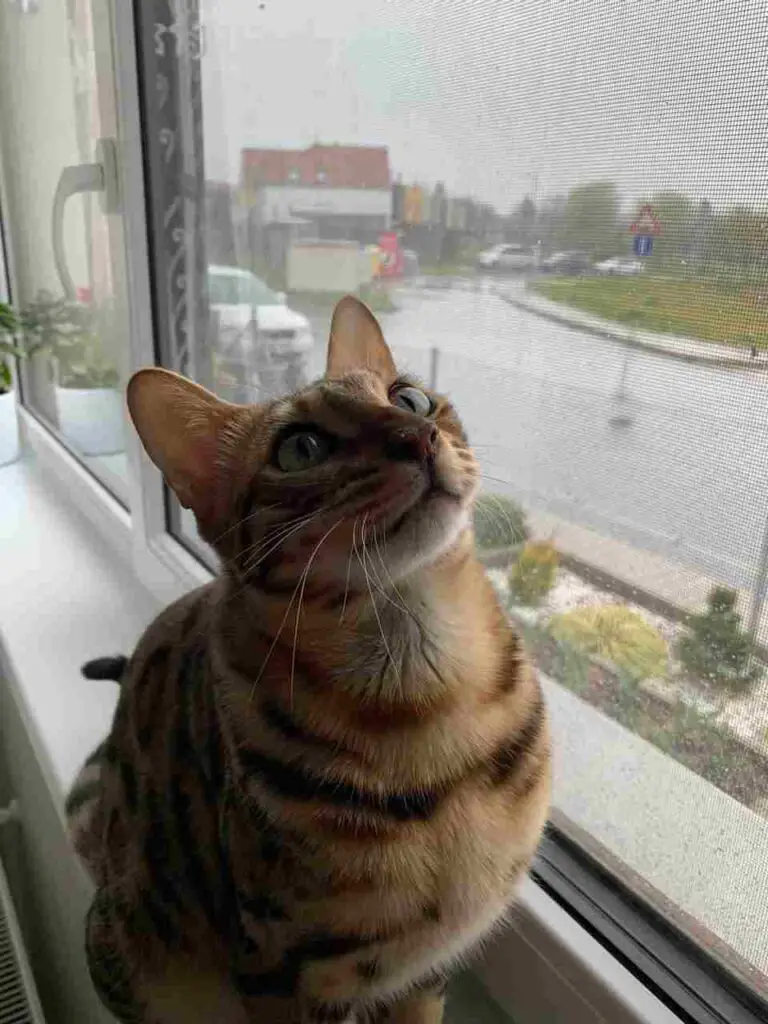
If your Bengal cat stops eating, it can be a cause for concern. As a responsible pet owner, it’s important to address this issue promptly.
Here are some effective things you can do to help your Bengal cat regain their appetite:
1. Monitor the situation: Keep a close eye on your cat’s eating habits and observe any other changes in their behavior. Is their lack of appetite accompanied by other symptoms like lethargy or vomiting? This information will be helpful when discussing the issue with your veterinarian.
2. Check for potential health issues: Cats can lose their appetite due to various health issues. Look for signs of dental problems, mouth sores, or digestive issues. If you notice anything unusual, it’s crucial to consult a veterinarian for a thorough examination.
3. Ensure a stress-free environment: Bengal cats are known for their active and energetic nature. They can easily become stressed or anxious, which may lead to a loss of appetite. Create a calm and peaceful environment by providing hiding spots, interactive toys, and a routine that includes playtime and relaxation.
4. Offer a variety of food: Cats can be picky eaters, and their preferences may change over time. Experiment with different flavors and textures of cat food, including wet and dry options. You can also try warming the food slightly to enhance its aroma and make it more enticing.
5. Try hand-feeding: Sometimes, a Bengal cat may respond positively to hand-feeding. This can help establish a bond and encourage them to eat. Use small pieces of their favorite treats or moistened food to entice them. Be patient and gentle during this process.
6. Maintain proper hydration: Dehydration can worsen a cat’s appetite. Ensure your Bengal cat has access to fresh water at all times. Additionally, you can try offering them wet food or adding water to their dry food to increase their fluid intake.
7. Consider dietary supplements: Discuss with your vet the possibility of using appetite stimulants or nutritional supplements. These can help boost their appetite and provide essential nutrients that may be lacking in their diet.
8. Consult with a veterinarian: If your Bengal cat’s appetite doesn’t improve or if you notice any other worrying symptoms, it’s crucial to seek professional veterinary advice. A veterinarian can conduct a thorough examination and provide appropriate guidance and treatment options.
9. Be patient and persistent: Remember that cats can be finicky eaters, and it may take time to find a solution. Stay patient and persistent in your efforts to encourage your Bengal cat to eat. With love, care, and proper veterinary guidance, you can help them regain their appetite and overall well-being.
Please note that while these suggestions can be helpful, it’s essential to consult with a veterinarian for a proper diagnosis and tailored advice based on your Bengal cat’s individual needs.
Conclusion
In conclusion, if your Bengal cat is not eating, it’s essential to address the issue promptly. Remember, a loss of appetite can be a sign of underlying health concerns or stress. Reach out to your veterinarian to ensure your feline friend gets the necessary care and attention they need to regain their appetite and overall well-being.
Frequently Asked Questions
My Bengal cat has suddenly stopped eating. What could be the reason?
It’s common for Bengal cats to experience changes in appetite from time to time. There could be a few reasons why your Bengal cat is not eating. It might be due to stress or anxiety, a change in their environment, or even a health issue. If your cat’s appetite doesn’t improve within a day or two, it’s best to consult a veterinarian to rule out any underlying medical conditions.
How can I tell if my Bengal cat’s lack of appetite is due to stress?
Cats, including Bengals, can be sensitive to changes in their environment, and stress can affect their appetite. If your Bengal cat is not eating and you suspect stress might be the cause, look for other signs such as hiding more than usual, excessive grooming, or changes in litter box behavior. Creating a calm and secure environment for your cat, providing plenty of playtime and mental stimulation, can help alleviate stress and improve their appetite.
My Bengal cat seems healthy but still refuses to eat. What should I do?
If your Bengal cat appears to be in good health but is not showing interest in food, try offering different types of food to see if there’s a preference. Sometimes cats can be picky eaters. You can also try warming up the food slightly to enhance its aroma and make it more appealing. However, if your cat continues to refuse food for more than a day or two, it’s essential to consult a veterinarian to rule out any underlying health issues.
Can I try any home remedies to stimulate my Bengal cat’s appetite?
While it’s always best to consult a veterinarian for a proper diagnosis, there are a few things you can try at home to help stimulate your Bengal cat’s appetite. One option is to offer small, frequent meals throughout the day instead of leaving food out all the time. You can also try adding a small amount of warm water or low-sodium chicken broth to their food to enhance its flavor. However, if your cat’s appetite does not improve, it’s crucial to seek professional veterinary advice.
Should I be concerned if my Bengal cat goes without eating for a day?
While it’s not uncommon for cats, including Bengals, to skip a meal occasionally, it’s important to monitor their behavior and appetite closely. If your Bengal cat goes without eating for more than 24 hours and shows no interest in food, it’s best to consult a veterinarian. Cats can develop a serious condition called hepatic lipidosis (fatty liver disease) if they go without eating for an extended period, so it’s better to be safe and seek professional advice to ensure your cat’s well-being.
